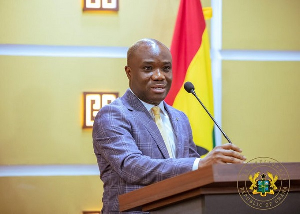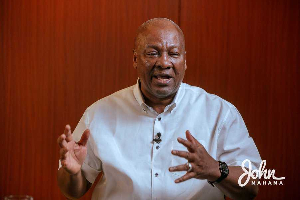Accra, July 26, GNA - Ghana has launched a plantations' development programme to regain its lost forest cover in line with global development objectives particularly, the Millennium Development Goals, Alhaji Collins Dauda, Minister of Lands and Natural Resources, said on Monday.
According to him, the strategy adopted by Ghana to increase her forest cover would also provide the opportunity for the use of forests to improve livelihoods and reduce poverty in forested local communities.
Alhaji Dauda announced this in an address read for him by Mr. Henry Ford Kamel, the Deputy Minister of Lands and Natural Resource, at the opening of a five-day workshop of the major groups-led initiative in support of United Nations Forum on Forests (UNFF) in Accra.
Participants from all over the world are attending the forum to discuss leadership role of women in forest management, how sustainable forest management would improve livelihoods of forests depended people as well as make recommendations to inform various governments attending and celebrating the 2011 International Year of Forest (IYF).
The launching is scheduled for New York and celebration worldwide with various programmes and activities in all 192 countries within the UN systems.
Alhaji Dauda said government's commitment in arresting deforestation and forest degradation had also given way in establishing an apex body to ensure effective environmental governance and management in Ghana, known as the Environmental and Natural Resources Advisory Council (ENRAC) chaired by Vice President John Dramani Mahama.
He said despite Ghana's numerous efforts in protecting, preserving and implementation of forests instrument, there still remained challenges like promoting cross-sectoral coordination, strengthening law enforcement and developing effective forest financial strategies.
Alhaji Dauda noted that forest financing had become one of the key challenges for governments in developing countries, particularly for tropical timber producing countries such as Ghana.
However, he expressed the hope that, there was a growing commitment to forest financing which would be an addition to existing financial support and not re-distribution to help developing countries to reduce emissions from deforestation and degradation to rather support conservation, sustainable forest management and enhancement of carbon stocks.
The Sector Minister complained about illegal logging, describing it as one of the major causes of conflicts and degradation of forests and called for due consideration to the role of forests and natural resources in post conflict management particularly, the use of natural resources in post conflict reconstruction.
He said Ghana had signed a voluntary partnership agreement with the European Union to ensure that only timber from legal sources could be sold on both local and international markets as a sign to check illegal logging.
Mr. Lambert Okrah, Workshop Coordinator said issues of people's livelihood and poverty were important in that while the forestry resources were dwindling, the conditions of livelihood kept impoverished, thus the need to redouble efforts to replenish forests globally.
He stressed the need for fairness in the use of forest resources, expressing the hope that the workshop would help come out with concrete and positive suggestions to help save the situation.
Madam Jan McAlpine, Director, UN Forum on Forests, said about 1.6 billion people around the world depended on forests for their values while forests continued to provide 70 per cent of primary health care for the world's people.
She noted that there was therefore the need for all stakeholders to come together to integrate forest development plans because "the forest have the potential for mitigating climate change".
General News of Monday, 26 July 2010
Source: GNA
















